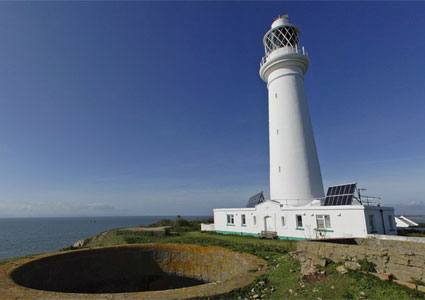
Flat Holm (Welsh: Ynys Echni) is a limestone island lying in the Bristol Channel approximately 6 km (4 mi) from Lavernock Point in the Vale of Glamorgan, but in the City and County of Cardiff. It includes the most southerly point of Wales.
The island has a long history of occupation, dating at least from Anglo-Saxon and Viking periods. Religious uses include visits by disciples of Saint Cadoc in the 6th century, and in 1835 it was the site of the foundation of the Bristol Channel Mission, which later became the Mission to Seafarers. A sanatorium for cholera patients was built in 1896 as the isolation hospital for the port of Cardiff. Guglielmo Marconi transmitted the first wireless signals over open sea from Flat Holm to Lavernock. Because of frequent shipwrecks a lighthouse was built on the island, which was replaced by a Trinity House lighthouse in 1737. Because of its strategic position on the approaches to Bristol and Cardiff a series of gun emplacements, known as Flat Holm Battery, were built in the 1860s as part of a line of defences, known as Palmerston Forts. On the outbreak of World War II, the island was rearmed.
It is now managed by Cardiff Council’s Flat Holm Project Team and designated as a Local Nature Reserve, Site of Special Scientific Interest and a Special Protection Area, because of the maritime grassland and rare plants such as Rock Sea-Lavender (Limonium binervosum) and Wild Leek (Allium ampeloprasum). The island also has significant breeding colonies of Lesser Black-backed Gull (Larus fuscus), Herring Gull (Larus argentatus) and Great Black-backed Gull (Larus marinus). It is also home to Slow worms (Anguis fragilis) with larger than usual blue markings.